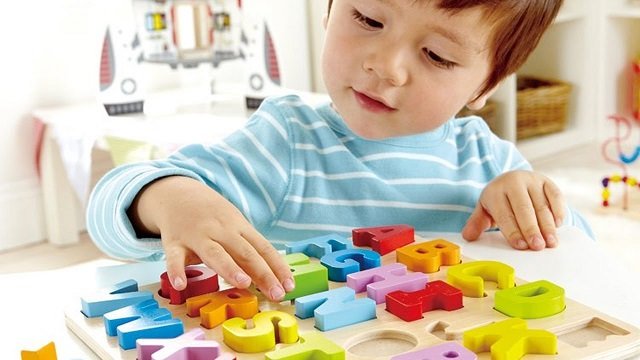If you think about it, the pace at which young kids learn is simply amazing. Sometimes pre-schoolers as young as 4 years of age are learning to read and write. This is a BIG thing for little minds and can sometimes be a bit overwhelming, especially when their talents make us as parents expect too much of them. The trick is to keep it fun and simple.
Educate pre-schoolers by sticking to games and activities that allow them to learn through play, this way they can learn while having fun, without feeling the tedious task that often comes with acquiring new skills and achievements. Our kids have plenty of formal educational years ahead of them, let them be kids for as long as you can.
This does not mean however that you should not introduce them to new things like learning how to read and write at an early age. Just make sure you do it in a way that they can understand, get down to their level, that is.

For instance, when it comes to learning the Alphabet, fifty-two letter shapes are a lot for little minds to keep track of. Recently I stumbled upon this sweet little way of helping children to remember some letters, as well as how to write them. Now, I do realise that it is important for youngsters to start learning the diminutive form of letters first, but you can adapt the below and create your own explanations for letters not mentioned.
- The letter B is a line with a double bubble.
- The letter D is a line with one big belly.
- The letter E is for exercise -- two arms and a leg.
- The letter I is a person with a hat and shoes.
- The letter H is two roads with a bridge across.
- The letter Q is a wheel with a kickstand.
- The letter T is an "I" whose shoes fell off.
- The letter Y is shaped just like a necktie.
Source reference: https://www.parents.com/toddlers-preschoolers/development/writing/helping-kids-learn-to-write/
There are an endless number of creative and fun ideas on the internet that can be used to teach your youngsters how to read, write and even do mathematics – so, use them! While it might seem like the kids are not grasping the intent of the lesson at first, after a few rounds of practice and repeat, they will get the gist of it and might even surprise you with what they learnt days later.
The point is, little kids, even toddlers, are capable of learning to count, say their ABC’s and even read and write, but these are not skills that we should be forcing upon them, instead, guide them towards the process, bit by bit, until they do reach school-going age, where their teachers will give them more formal explanations on the subjects. If our kids are well-equipped and have a sound foundation of the concepts, the will be pro readers, writers and maths geniuses in no time!
Is English not your first language? We can help your Steemit posts reach the English communities to increase their views as well as upvotes! Our mission here at Steemiteditors is to offer an editing service, so that your post includes the correct usage of the English language, making it easy to understand by readers. In essence, we help you to get your message across!
The steps are simple and the rewards are great! The @steemiteditors team includes qualified participants who are experts in the fields of: editing, copywriting and translating. FIND OUT MORE HERE

Downvoting a post can decrease pending rewards and make it less visible. Common reasons:
Submit
As a teacher I think this is a contradictory topic. It is true, that children are capable to learn and do learn huge amount of things even when they are in the womb. It can be very beneficial to help them orientate their attention towards linguistic and mathematical matters, so that they develop an interest towards these kinds of things.
But this is exactly what shouldn't be forced in my opinion, nor is the actual teaching of these subjects before school age, because there is a high risk of teaching certain things, problem solving or thinking in ways that make learning harder in the long run. There's a justifiable reason why certain things are taught in a certain order, so that ones thinking develops in a logical way.. So for example if someone teaches their children to read at home, there are many risks of going wrong there when it comes to future learning (You should lear the written and alphabets and maching phones/sounds, how to combine letters into syllables, words and then sentences etc) and all this should be learnt in logical order so that these skills support each other the best way. This applies at least in Finnish language which can be quite complicated…
p.s. Please excuse my English, it is not (as you can see) my native language, so it can be quite difficult to write about these kinds of complicated (yet so interesting imo) subjects in English.
Downvoting a post can decrease pending rewards and make it less visible. Common reasons:
Submit